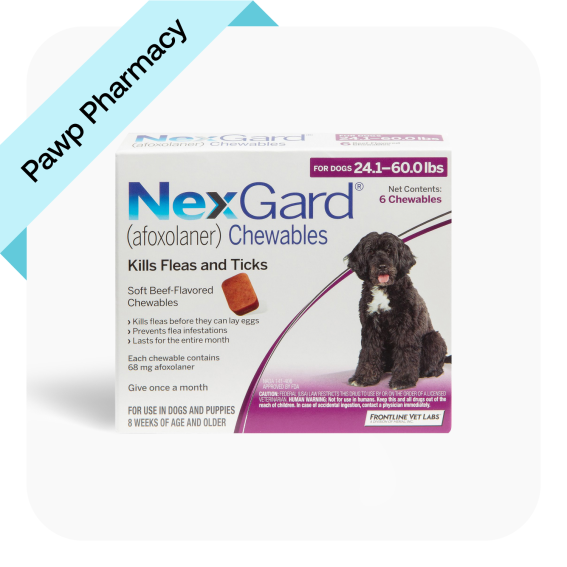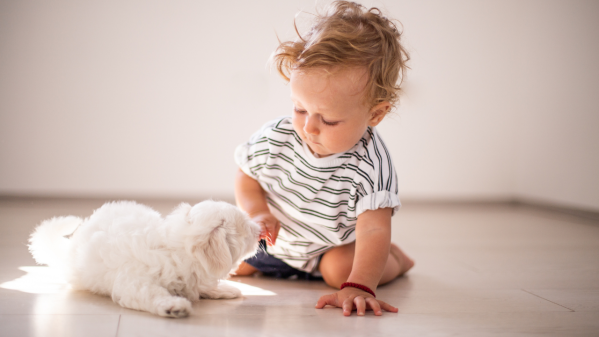Having a pet and a baby (or a few of each) can be a lot to manage.
Everyone is on a different schedule, has varying needs, and are all vying for your attention.
In the thick of the chaos, you might notice small clusters of discolored bumps on your baby. Come to think of it, Fido has been itching a lot, too. And…wait, did we give him his flea medication last month?
Could it be that you’re seeing flea bites on your baby?
Yes. Babies can get fleas. In fact, they can get fleas even if you don't have pets in your home.
But don��’t panic, the vet team at Pawp is here to help get your family back on track and itch free.
Learn how to identify flea bites on babies, what to do if you see them, and how to prevent this from happening in the future.
How to identify flea bites on your baby
Flea bites tend to present in small clusters or a straight line. These tiny discolored or red bumps will be extremely itchy and irritating, and can also swell and blister. You may also notice a discolored ring around the bumps.
These flea bites either came from fleas from your pet and inside your home, or from a location outside your home, whether it be in the yard or at a relative’s house.
And yes, you can have a flea infestation in your home even if you don’t have pets. Stray animals, other children at daycare, and pets and children of relatives and friends can be hosting and spreading these pesky pests.
If you have a pet that is showing signs of fleas—itching, scabbing, redness, sores, or hair loss—there may be a flea infestation occurring in your home. That sounds scary, but with the right tools and medical professionals, you can eliminate fleas from your home, pet, and baby.
What to do if you see flea bites on your baby
The first step is to involve both your pediatrician and your vet. Together, they’ll be able to get relief for your baby and pet.
It's important to consult your baby's doctor immediately, since fleas can transmit parasites and other diseases.
To provide your baby with some relief in the meantime, your pediatrician may suggest over-the-counter anti-itch creams and/or antihistamines. It's possible that your baby may also have an allergic reaction, headache, fever, or body aches as a result of the flea bites. In this case, your pediatrician will be able to provide the right direction and medication to ease symptoms.
It's also important to contact a vet, since your pet is at the same risk of disease from fleas. Your vet will make a suggestion on the topical or oral flea medication that's right for your dog or cat.

NexGard Chewable, 24.1-60 lbs, (Purple Box), Rx$30
If you're a Pawp member you can purchase your flea and tick medication through the Pawp Pharmacy. You will already need to have a prescription.
Read: The Best Dog Flea & Tick Medications Of 2022
How to prevent your baby (and pet) from getting fleas
It’s one thing to have a dog or cat dealing with fleas, but it’s a whole other level of anxiety and difficulty when your pet passes fleas to your baby. The more you prevent your pet from getting fleas, the higher level of protection your baby will have.
The most important thing you can do is to consult a vet about which flea medication is best for your pet and make sure you administer it correctly and on time.
"The prescription flea products available from your vet are likely the safest and most effective options available," says Dr. Jo Myers, DVM. "They come with the added benefit of a veterinary professional who can explain how to use it correctly as well as address how the particular product will fit into your unique lifestyle as well as your pet's health status."
You should also regularly check your pet's skin and coat for small black specks and be on the lookout for suspicious hair loss, itching, and scratching.
If you are dealing with an existing flea population within your household, there are some “pest practices” that you should follow:
Use an approved environmental spray that contains an IGR (insect growth regulator) to treat carpets and other non-pet things in the environment.
Vacuum and launder bedding frequently. Make sure you throw the vacuum bag away from the house, because the eggs in the bag can hatch and re-infest the area. Eliminating carpet and bedding is also helpful.
Use one of the forms of flea control on your pet that also treats the environment in an effort to kill larvae. This largely occurs by dandruff in naturally shed skin carrying the active ingredient down into the carpet and bedding.
Stick with it. Even when you're doing everything right and following all the "pest practices" recommended by your veterinary professional, it takes at least three months to eliminate and existing flea population within your household.
Making sure you’re up to date and on time with your flea medication benefits more than just your pet. Reach out to Pawp's vet team if you have any questions about how to treat or prevent flea bites on your dog or cat so you can keep your baby safe, too.
Sources:
What Are the Dangers of Flea Infestations to an Infant? | Hello Motherhood
